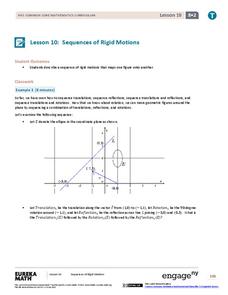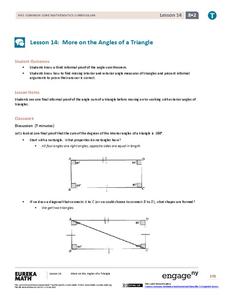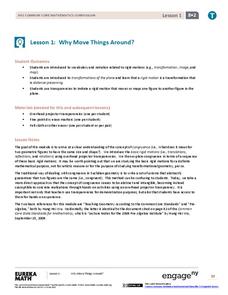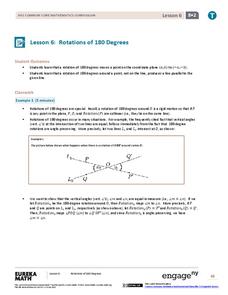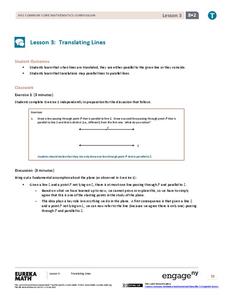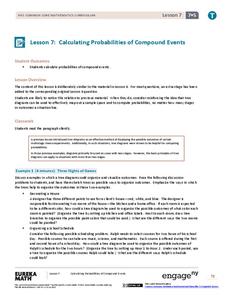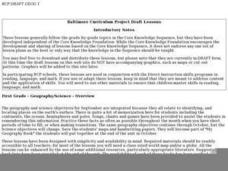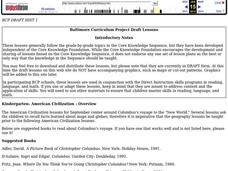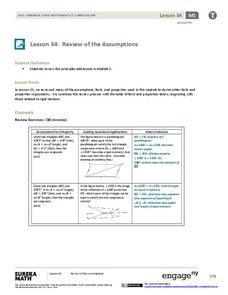EngageNY
Sequencing Rotations
Discover the result of a sequence of rotations about different centers. Pupils perform rotations to examine the patterns. They also describe the sequence of rotations that performed to reach a desired result in the ninth installment in a...
EngageNY
Sequences of Rigid Motions
Examine the various rigid transformations and recognize sequences of these transformations. The lesson asks learners to perform sequences of rotations, reflections, and translations. Individuals also describe a sequence that results in...
EngageNY
More on the Angles of a Triangle
Angles and triangles: they're all connected. Uncover the connections between angles in triangles. Scholars learn how to find both exterior and interior angle measures in triangles. The lesson emphasizes the vocabulary related to these...
EngageNY
Why Move Things Around?
Explore rigid motion transformations using transparency paper. Learners examine a series of figures and describe the transformations used to create the series. They then use transparency paper to verify their conclusions.
EngageNY
Definition of Reflection and Basic Properties
Discover the results of reflecting an image. Learners use transparency paper to manipulate an image using a reflection in this fourth instructional activity of 18. They finish by reflecting various images across both vertical and...
EngageNY
Definition of Rotation and Basic Properties
Examine the process of rotating images to visualize effects of changes to them. The fifth lesson of 18 prompts pupils to rotate different images to various degrees of rotation. It pays special attention to rotations in multiples of 90...
EngageNY
Rotations of 180 Degrees
What happens when rotating an image 180 degrees? The sixth lesson in the series of 18 takes a look at this question. Learners discover the pattern associated with 180-degree rotations. They then use transparency paper to perform the...
EngageNY
Definition of Congruence and Some Basic Properties
Build a definition of congruence from an understanding of rigid transformations. The lesson plan asks pupils to explain congruence through a series of transformations. Properties of congruence emerge as they make comparisons to these...
EngageNY
Distance on the Coordinate Plane
Scholars learn how to find the distance of vertical and horizontal line segments on the coordinate plane in the 19th installment of a 21-part module. The use of absolute value comes in handy.
EngageNY
Angles Associated with Parallel Lines
Explore angle relationships created by parallel lines and transversals. The 13th lesson of 18 prompts scholars use transparency paper to discover angle relationships related to transversals. Learners find out that these angles pairs are...
EngageNY
Similarity
Use the coordinate plane to show two figures are similar. The lesson plan incorporates congruence transformations and dilations to move a figure on to another figure. Pupils determine that if a similarity transformation exists between...
EngageNY
Definition of Translation and Three Basic Properties
Uncover the properties of translations through this exploratory lesson. Learners apply vectors to describe and verify transformations in the second installment of a series of 18. It provides multiple opportunities to practice this...
EngageNY
Translating Lines
Define parallel lines through transformations. The third lesson plan of 18 examines the result of the translation of a line. Two possible outcomes include coinciding lines and parallel lines.
EngageNY
Calculating Probabilities of Compound Events
Use tree diagrams with multiple branches to calculate the probabilities of compound events. Pupils use tree diagrams to find the sample space for probability problems and use them to determine the probability of compound events in the...
Curated OER
Vertical and Horizontal Translations
Students analyze function graphs. In this Algebra II/Pre-calculus lesson, students investigate the graph of a function as they determine to which family of functions it belongs, determine the parent function and describe the translation...
Curated OER
The Class Trip
Mrs. Moore's class is trying to earn money for a trip to the science museum, but how much more do they need? Solve this problem with your own class as they develop their ability to model real-life situations algebraically. As an added...
Curated OER
Exploring Solving Equations
Put out by Texas Instruments, this instructional activity involves learners in an activity focused on adding polynomials, solving equations, factoring trinomials, and expanding binomials. A TI-89 calculator is needed to complete this...
Curated OER
Geography: Continents
First graders identify basic geographical facts about the world they live in and distinguish between land and water on a globe. They research the continents and information associated with each one focusing on building their map skills.
Curated OER
American Civilization
Students review map and globe skills. They gather background to the story of Christopher Columbus' voyage.
Curated OER
Data-gathering Activities Relating to Trees in Their Environment
Students gather data relating to trees in their environment. In this biology lesson plan, students determine heights of trees and their ages. A canopy map will indicate optimal growing areas for the tree.
EngageNY
Correspondence and Transformations
Looking for a strategy to organize the information related to transformations? The materials ask pupils to identify a sequence of rigid transformations, identify corresponding angles and sides, and write a congruence statement. They...
EngageNY
Dilations as Transformations of the Plane
Compare and contrast the four types of transformations through constructions! Individuals are expected to construct the each of the different transformations. Although meant for a review, these examples are excellent for initial...
EngageNY
Review of the Assumptions (part 2)
Is the amount of information getting overwhelming for your geometry classes? Use this strategy as a way to organize information. The resource provides a handout of information studied in relation to triangle congruence. It includes a...
EngageNY
Motion Along a Line – Search Robots Again
We can mathematically model the path of a robot. Learners use parametric equations to find the location of a robot at a given time. They compare the paths of multiple robots looking for parallel and perpendicular relationships and...



